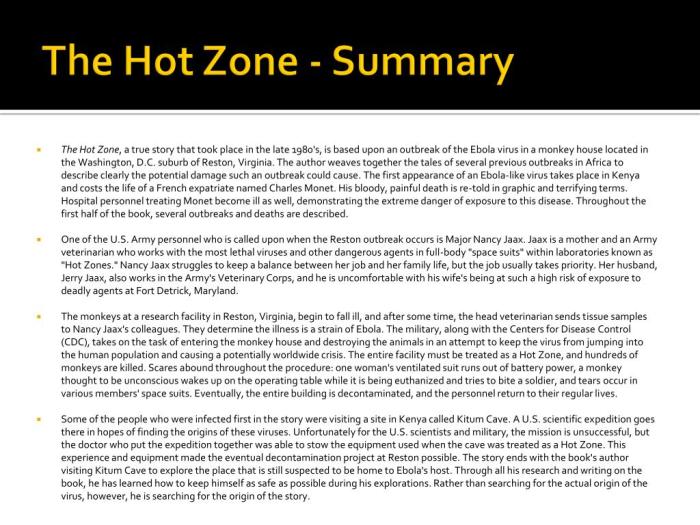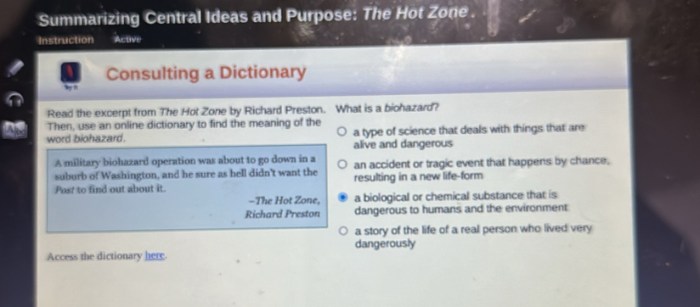Summarizing central ideas and purpose the hot zone – Delving into the heart of “The Hot Zone,” this analysis unveils the central ideas and purpose of Richard Preston’s gripping narrative. Through a comprehensive exploration of the text, we will uncover the main arguments, supporting evidence, and overall message that Preston seeks to convey about the Ebola virus outbreak and its profound implications.
This journey will illuminate the role of scientists and researchers in understanding and combating the deadly virus, while also examining the ethical considerations surrounding their work. Furthermore, we will delve into the global health implications of the outbreak, highlighting the importance of international collaboration and resource allocation.
1. Summarizing Central Ideas
The Hot Zone is a non-fiction book by Richard Preston that explores the history of the Ebola virus and the efforts to contain it. The book’s central idea is that the Ebola virus is a highly contagious and deadly virus that can cause a pandemic if not properly contained.
Preston supports this argument by providing a detailed account of the initial outbreak of the Ebola virus in Africa, the challenges and risks associated with containing the virus, and the role of scientists and researchers in understanding and combating the virus.
The overall message of The Hot Zone is that the Ebola virus is a serious threat to global health and that international collaboration and resource allocation are essential to preventing a pandemic.
2. Purpose of “The Hot Zone”

Richard Preston wrote The Hot Zone to raise awareness of the Ebola virus and the threat it poses to global health.
Preston’s target audience was the general public, and he intended to inform and educate readers about the virus, its history, and its potential consequences.
The book was published in 1994, at a time when the Ebola virus was relatively unknown outside of Africa. Preston’s book helped to bring the virus to the attention of the world and to raise awareness of the need for international collaboration to prevent a pandemic.
3. Ebola Virus Outbreak

The initial outbreak of the Ebola virus occurred in 1976 in the Democratic Republic of the Congo. The virus was named after the Ebola River, near which the outbreak occurred.
The virus spread rapidly, causing a high number of deaths. The outbreak was eventually contained, but it demonstrated the potential of the virus to cause a pandemic.
The Ebola virus is a highly contagious and deadly virus that can cause a variety of symptoms, including fever, muscle pain, vomiting, and diarrhea. The virus can be transmitted through contact with infected blood or bodily fluids.
4. Role of Scientists and Researchers

Scientists and researchers have played a critical role in understanding and combating the Ebola virus.
Scientists have developed diagnostic tests to identify the virus, and they have developed treatments to help patients survive the infection.
Researchers are also working to develop a vaccine to prevent the Ebola virus. The work of scientists and researchers is essential to preventing a pandemic.
Essential Questionnaire: Summarizing Central Ideas And Purpose The Hot Zone
What is the central thesis of “The Hot Zone”?
The central thesis of “The Hot Zone” is that the Ebola virus is a deadly and highly contagious pathogen that poses a significant threat to global health, and that the development of effective vaccines and treatments is crucial for preventing future outbreaks.
What is the purpose of Preston’s narrative style in “The Hot Zone”?
Preston’s narrative style in “The Hot Zone” combines elements of literary and scientific writing to create a compelling and accessible account of the Ebola outbreak. By weaving together personal anecdotes, scientific data, and historical context, Preston aims to educate readers about the virus and its potential impact while also highlighting the human stories behind the headlines.
What are the ethical implications of the research conducted by scientists in “The Hot Zone”?
The research conducted by scientists in “The Hot Zone” raises important ethical questions, particularly regarding the use of experimental treatments on human subjects and the potential risks associated with manipulating deadly pathogens. Preston explores these ethical dilemmas and encourages readers to consider the balance between scientific progress and the protection of human life.